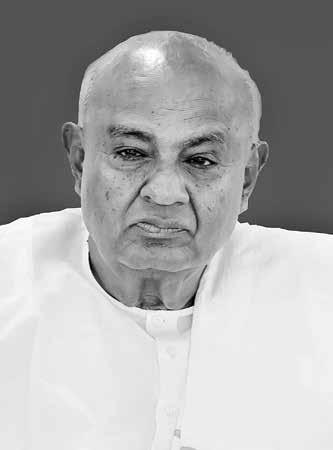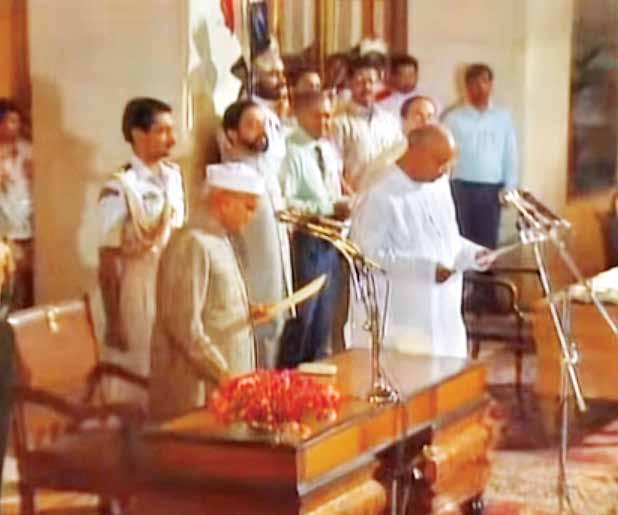
5 minute read
HD Deve Gowda
India’s first Accidental Prime Minister; 25 Years Ago
By Ravi Kant
Advertisement
Late 90’s; Congress is weak; too many political parties spewing here and there; coalitions and contradictions and a hung Parliament in the scenario. Exactly 25 years ago, HD Deve Gowda was at the centre of one of the surprising turn of events in the country's political history that catapulted him onto the national stage and securing the Prime Minister's post without seriously aspiring for it.
At times one has to give credit to destiny too. With barely 18 months as the Chief Minister of Karnataka, Gowda, who has had no big role in national politics till then, assumed charge as the 11thPrime Minister on June 1,1996, after emerging as the leader of the 13-party United Front, which was supported by the Congress from outside.
Congress losing decisively in the 1996 Lok Sabha election. All credit to the speedy Bhartiya Janata Party riding on the popular ‘Ram Rath.’ The fall of the 13-day government led by BJP's Atal Bihari Vajpayee, preceded Deve Gowda’s entry into the national political scene. Popularly known as "Mannina Maga" (son of the soil), Gowda is the only Kannadiga and second south Indian after P V Narasimha Rao to have occupied the top post.
Gowda, who has called himself an "Accidental Prime Minister" on several occasions in the past, has stated that it was leftist stalwart Jyoti Basu's chance to become PM that surprisingly landed in his lap, and it was the former West Bengal Chief Minister himself who proposed his name for the top post.
Gowda was Prime Minister for less than a year (324 days) until April 21, 1997, as had to demit office, with Congress withdrawing support. It is said that Gowda's differences with Sitaram Kesri, who became Congress president after Narasimha Rao, cost him the post, following which Inder Kumar Gujral was chosen as leader of the United Front and he became the Prime Minister.
Currently, the 88-year-old leader is a member of Rajya Sabha and is serving as the president of Janata Dal (Secular).
C M Ibrahim, who was Minister of Information and Broadcasting in Gowda's cabinet has termed the tenure under the former Prime Minister as the "golden era of the country", and for the first time a "man from the soil, a humble farmer", had risen to that level. Ibrahim may have forgotten the history of Lal Bahadur Shastri.
Recalling the "corruption-free" administration, he said, Gowda's ‘dress, character and history’ was all ‘white’,

and pointed out that he ‘showed the world that Kashmir was part of India and the strength of democracy by holding elections, and through his multiple visits there.’
Highlighting Gowda's simplicity and modest living amid Lutyens' Delhi, Ibrahim said he relished his favourite "Ragi Mudde" (Ragi dumplings) even at 7, Race Course Road, the PM's official residence and the doors were open for any one who come to meet him. "Its bad luck of this country that his tenure was short, Sitaram Kesri knowing that if he will allow this south Indian, he may become another Chaudhary Charan Singh (former PM) from Karnataka, withdrew support," he said, while listing Gowda's various contributions to the country and the state, especially like the Upper Krishna Project. One-time close associate of the former Prime Minister, Ibrahim is currently with the Congress as its MLC, and has dropped hints about plans to come back to the JD(S).
HD Kumaraswamy too remembers his father’s Prime Ministership as one of the watershed moments in the political history of India. In a writeup about his father's political legacy on the occasion of the silver jubilee of oath-taking as PM, Kumaraswamy describes Gowda's 11 months of Prime Ministership, as a "milestone",
as he took the country towards development without any corruption. "In his (Gowda) long political career, he was in power only for 18 months as CM and 11 months as PM; but power never made him arrogant; he never gave up his ideology for the sake of power," says Deve Gowda. State Congress President DK Shivakumar said it is a matter of great pride for Karnataka that Gowda was the Prime Minister.
Shivakumar apprises, "No one from the state had got that opportunity... because of his struggle he reached the top post. It was a happy moment for all of us, leaving aside political differences. Let him continue to guide the state," he said.
Gowda counts his visits to Jammu and Kashmir, shortly after taking over, and the first PM do so after a gap of nine years, also about holding elections there in 1996, thereby ending the long stint of Governor's rule (about six years) among the highlights of his tenure.
Another achievement he often highlights is the ceasefire agreement with Naga groups in 1997, which followed his meeting as Prime Minister with Naga leaders Isak Chishi Swu and Thuingaleng Muivah in Zurich, in February that year, as a result of "constructive diplomacy.” n
DEBACLE OF 2019
Narendra Modi, another leader who had risen from the ground, secured a massive majority for the second run of his government. The 2019 results for BJP is mesmerising but many a tall leaders of opposition parties found themselves in trouble in the second Modi wave. Rahul Gandhi’s loss in Amethi became a case study for the country, but many in south believe that the key debacle down south was when HD Deve Gowda, who remained undefeated in elections for ----years, lost to a young BJP candidate from Gowda’s very own constituency -----. The grand leader of Karnataka lost by a little margin of ------- but the result has sent an uneasy ripple across the opposition parties across the country, let alone south.









